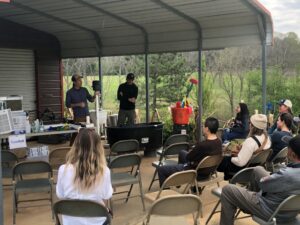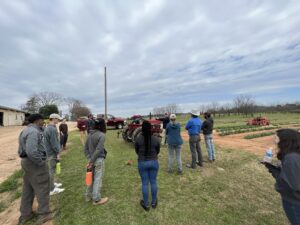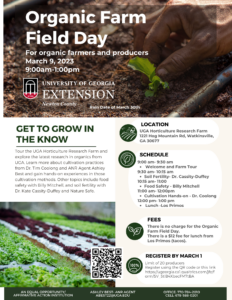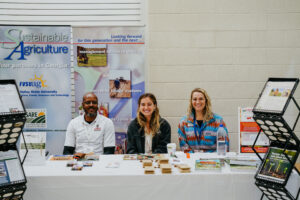Final report for SGA21-001
Project Information
This report covers activities from 2021 through early 2024.
The SARE Advisory Committee had a conference call on February 5, 2021 to discuss committee memberships, review activities for the year, and discuss future training needs. The SARE Logic Model training objectives are conservation tillage systems, organic production, grazing-based animal production systems, composting, direct marketing, and local food systems. The committee decided what trainings and conferences to promote for the upcoming year that would address several of the SARE Logic Model training objectives. Specifically, the committee felt that more opportunities needed to be present for training in organic peanut production, cover crops and conservation tillage, grazing, online marketing for farms, GAP programs, and grazing production systems. In addition, travel support for Extension agents to attend conferences (National Grazing Lands Conference) were discussed. These activities increase knowledge and confidence in participating agriculture professionals which then translates to an increased ability to assist organic, resource-limited, and small farmers.
The long-term goal of the Georgia Model State Program is “increased use of sustainable agriculture practices by producers at multiple scales supported by a knowledgeable network of agricultural professionals ensuring a high proportion of diverse, profitable, and environmentally-friendly farm operations." We plan to accomplish this by hosting workshops and educational opportunities, and offering scholarships to Extension agents and specialists, agricultural professionals, NRCS personnel, agricultural and environmental researchers, and community leaders. The SARE Advisory Committee has used the Georgia Model State Program Logic Model to identify the following six areas of focus for training workshops and scholarships: conservation tillage systems, organic production, grazing based animal production systems, composting, direct marketing, and local food systems.
Advisors
Education
The SARE model state program for UGA provides education opportunities in sustainable agriculture. The model state program supports outreach and education efforts that coincide with large conferences/meetings such as the Southeastern Regional Fruit and Vegetable Conference and many others. The program efforts are based on advisory panel meetings where we identify topics that are important to our clientele. The program supports workshops, offering scholarships to conferences, and delivering educational classes regarding sustainable agriculture throughout the state of Georgia. Agents are provided training in sustainable agriculture through foundation training for new agents, conference scholarships, providing access to SARE books and materials, and support in their county programming. We manage an e-mail listserv, a Sustainable Agriculture at UGA Facebook page and a Sustainable Agriculture at UGA website – all of which provides a wealth of information to the public regarding sustainable agriculture production practices, pertinent agriculture regulations, farm business resources, and an up-to-date list of local and regional programs and events happening in sustainable agriculture.
Education & Outreach Initiatives
Local food systems were identified by the SARE Advisory Committee as an area where more training was needed to increase the capacity of Extension and other agricultural professionals to provide technical assistance to growers. Funding from this grant allowed us to support a virtual multi-county Journeyman Farmer Training Program with printed materials and shipping costs so that workbooks could be sent to participants’ homes and eliminate in-person contact.
Local food systems were identified by the SARE Advisory Committee as an area where more training was needed to increase the capacity of Extension and other agricultural professionals to provide technical assistance to growers.
In 2021-2022 a Journeyman Farmer Program was offered in-person in Lincoln, Columbia, and McDuffie, Paulding and Carrol Counties. The SARE program supported printing costs for materials as well as providing the Building a Sustainable Small Business book from SARE publishing. The Journeyman program was part of a larger 2 year long program focusing on new growers getting into agriculture. (17 participants)
The Journeyman Program is also currently being offered in western (Paulding/Carrol Counties) Georgia led by Extension Agents Mary Sheffield and Paula Burke. (33 participants)
In 2022/2023 the Journeyman program was held again in Carrol/Paulding Counties and also held twice in Henry County Journeyman Farmer Flyer 2023 Henry County A Journeyman Farmer Flyer 2023 Henry County B
Henry County GA is part of the metro-Atlanta region and the journeyman program has received much interest from individuals looking to get into agricultural production in the area. This complements our support for urban agriculture initiatives in Georgia.
In 2022 the program was held in person with 50 attendees (17 from Lincoln, McDuffie, and Columbia counties) and 33 from (Carroll and Paulding counties) participating.
Because of the popularity and success of the Journeyman Program Fort Valley State University led and effort along with the the UGA SARE/ Sustainable Agriculture team worked working with the Small Business Development Center and Fort Valley State University to get the Journeyman Program approved as an FSA educational course that can be used to satisfy the education requirement for FSA loan recipients. This was successful in Fall 2021.
More than 60 people attended parts of the first Henry county Training. This program was so popular they have offered a second training in June 2023.
A small grower/local food organic production training was held on Sept. 23, 2022 at the UGArden facility. The objective was to introduce new growers to organic practices. This training was held as part of the Athens Area Sustainable Grower's Group in conjunction with Athens-Clark and Barrow County Extension.
Cover cropping, organic fertility, and small equipment was discussed in a hands-on 3 hour session. Retailers focused on organic farming techniques were present.
There were nearly 30 attendees representing a variety of different production systems and farms. The hands-on component was particularly successful. SARE PI Coolong presented at this program on cover cropping.
Topics range from fruit and vegetable production, including organic practices, to marketing and business. The SARE Advisory Committee indicated organic production as an area of training emphasis, and the objective of offering scholarships to this conference is to better familiarize agents with organic and sustainable practices.
We sponsored travel for 5 county agents to attend the SE regional fruit and vegetable conference in 2022 and 2023. This included a food safety training specifically held as a train-the-trainers event on the first day of conference in 2023. We supported additional travel and registration fees for agents to attend this training.
The attendees gained knowledge that will be used to aid farmers in their counties in implementing more sustainable practices and local and direct marketing of their products. The agents that attended work in counties with vegetable production that have a combined farm gate value of more than $750 million annually.
We wanted to demonstrate warm season cover crops for application after early spring crops are harvested in Georgia.
A demonstration was conducted in spring 2022 in two locations in Georgia - The Durham Horticulture Farm in Watkinsville, GA and the Crisp County Watermelon Research Park in Cordele, GA. Warm season cover crops included buckwheat, sorghum x sudan grass hybrid, cowpea, sunn hemp, and lab lab. A large field day/open house was held at the Watkinsville location on July 7, 2022. Cover crops were presented at the field day as well as a SARE booth where publications were shown and attendees were able to ask about the SARE program. More than 100 people attended including many agents and farmers.
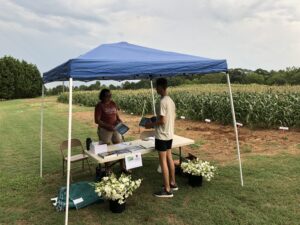
The outcomes will be that agents will be more familiar with growth habits of warm season cover crops. While many growers in Georgia use cool-season cover crops, warm season cover crops are sparingly utilized since they would be planted during the main growing season. Nonetheless, there are situations where warm season cover crops would fit into niches. More than 100 attendees visited the cover crop/SARE stop on the tour.
A food safety training will be held June 25, 2022 at the UGA Durham Horticulture Farm with the objective of teaching small growers how to improve sanitation and washing of produce.
The field day with bubbler training was held on June 25th, 2022. The bubbler materials that were purchased with SARE funds were used again at a later training (see below) as well. Growers learned how to build a bubbler and got a price list of the materials needed. Mr. Billy Mitchell (Florida Organics OTI project manager) conducted the training.
Outcomes and impacts will be that local small farms are better equipped for managing produce food safety on their farms.
The UGA SARE program has worked with several agents in the Metro Atlanta region to provide grower training opportunities. These include the Athens Area Sustainable growers association and additional events targeting farmers in the Newton and Rockdale county region of metro Atlanta. We have conducted/assisted with multiple trainings that have been coordinated by the County ANR agents (Laura Ney, Ashley Best, Alicia Holloway) in the region. The objective is to improve production of organic produce in the metro Atlanta area.
Multiple trainings have been conducted in 2022 and 2023 with the support of SARE funding. These have included and Organic Farmer Training in March 2023 covering nitrogen mineralization in organic systems, food safety, cultivation systems and more. SARE funds were utilized to grow several plots of different brassica crops that were used for hands-on cultivation trainings, where growers were able to utilize different tractors/cultivation implements. In addition the SARE Crop Rotations in Organic Systems book was given to attendees.
The Athens area sustainable grower network held a Grow Your Farm workshop in Feb. 2023, with invited speakers from the UGA Small Business Development Center and the UGA Department of Agribusiness and Applied Economics. Attendees learned about the importance of record keeping and marketing for their farm businesses. Speakers covered templates and practical tips for both records keeping and marketing. During the working lunch, attendees shared strategies and insights with each other. Each attendee received the SARE book: Building a Sustainable Business at the training.
In June 2023, the Athens area sustainable grower network held an on-farm educational program at 3-Porch Farm https://3porchfarm.com/ . The UGA SARE program provided an honorarium for the time of the proprietors to discuss their operation and how they achieved success.
Over 40 farmers have attended these events. Nearly all of these growers focus on sustainable/organic production. The learning outcomes have been an increase in business knowledge related to their enterprise, increased production knowledge (food safety/fertility/cultivation) and increased networking opportunities among farmers.
A training for new agents focusing on the SARE program was held by SARE coordinator Coolong in Oct. 2022 in Athens, GA. The objective was to educate them about the SARE program and what it has to offer.
The training was held in Oct. 2022 and 22 agents attended. A one hour training on the SARE program (grants, mission, educational materials) was held for agents in a train the trainer model. Further, copies of managing cover crops profitably were included with educational materials for agents.
Agents learned about the SARE program and how it supports them and how they can support SARE programming in Georgia.
To promote the SARE program at Georgia organics and provide additional educational opportunities for ag. agents to learn about organic farming in Georgia.
We were able to provide support for several agents to learn more about organic production and also to help educate attendees about sustainable agriculture. Hundreds of publications (print outs) were handed out on topics ranging from pasture poultry to composting to crop rotation.
We provided a travel scholarship for Dr. Nicole Kennard to attend the Urban food systems symposium in 2022.
Dr. Kennard conducted research in Georgia comparing environmental impacts and soil health measures among 15 Georgia-based farms, investigating differences between:
- farm scales (small vs. large)
- management practices (organic vs. conventional)
- and locations (urban, peri-urban, and rural).
She presented her research findings at the at the Urban Food Systems Symposium at Kansas State University, USA Sept. 26-28 2022
Dr. Kennard was able to share insight about the food system in Georgia with scholars from around the world.
UGA SARE coordinator supported this scholarship 100% sing private funding and not SARE, but the scope of the work falls within the SARE program mission.
Mr. Garry Ogden from GA Hemp 4 Life LLC requested a travel scholarship so that he could attend a hemp building workshop and then return to Georgia to show other hemp growers how to best utilize fiber hemp in the building trade. This was train the trainer activity.
The Hemp Build Magazine https://hempbuild-community.circle.so/home held a multiple day workshop to demonstrate to builders how to utilize hemp in a pro + jobsite masterclass workshophttps://hempbuild-community.circle.so/c/hemp-build-school-pro/. Mr. Ogden attended in September 2023 for the multi-day training program. His scholarship consisted of the registration fee, while Mr. Ogden paid all other travel expenses. Upon returning to Georgia he will utilize his knowledge to help other growers and builders in the region better utilize fiber hemp products for building.
The learning outcome of this activity is that we now have a local (Georgia) based resource for builders and others involved in the fiber hemp industry to reach out to for knowledge of how to best use hemp building products. Hemp is a sustainable building product and if use of hemp in construction increases then there is potential for greater production in the US.
We partnered with GFVGA to help sponsor the organic education program that is part of the SE Regional Fruit and Vegetable Conference (January 2024) https://seregionalconference.org/.
While we have sponsored travel scholarships for Agents to attend this conference in the past we also help provide funding for GFVGA to bring in expert speakers for the organic program in 2024. The organic program had 10 speakers in 2024 including speakers from Grimmway Organics in Florida, The organic transitions program TOP, based out of Florida, Elijay Mushrooms, Georgia Organic Peanut Association, Texas A&M University and University of Georgia. We had more than 100 attendees for several of the talks including large scale farms looking to transition into organic production in the Southeast U.S.
We were able to educate a large number of growers and agriculture professionals on organic practices in a variety of scales and commodities. We were able to diversify the speakers that were brought in by helping sponsor this session. The overall conference had more than 3000 attendees, and while only a portion of those attendees visited the organic sessions, the organic program had increased visibility among many attendees.
Educational & Outreach Activities
2) Sustainable Agriculture at UGA Facebook page- The Facebook page is used to distribute news, event/workshop announcements, resources, and other information for farmers, gardeners, or the general public about sustainable agriculture. There are 759 followers of the Sustainable Agriculture at UGA Facebook page.
3) Sustainable Agriculture at UGA Website - The website is used to distribute news, event/workshop announcements, resources, and other information for farmers, gardeners, Extension personnel, or the general public about sustainable agriculture. Between July 1, 2019 and April 30, 2021, the Sustainable Agriculture at UGA website has had 52,140 page views. This is a significant increase in the number of visitors, possibly due in part to the reasons mentioned above, the switch to mostly online instruction due to the COVID-19 pandemic, and increased promotion of the website through social media, the Journeyman Farmer program, and other avenues.
4) UGA Sustainable Food Systems Initiative events- The Sustainable Agriculture team works with the Sustainable Food Systems Initiative at UGA as part of their executive committee. The SFSI meets twice a year, and plans sustainability and food systems related events for the upcoming year. The Sustainable Agriculture Program Assistant plays a role in executing these events. In the last year and with the help of Sustainable Ag at UGA, the SFSI has hosted a panel discussion on Interdisciplinary Careers in Sustainable Food Systems, co-hosted a screening and panel about the film “Hearts of Glass,” participated in a collaboration with UGA’s Grow It Know It program to create farm-to-school sustainable agriculture lesson plans for K-12 students and teachers, coordinated the National Needs Fellowship recipients and Sustainable Food System Graduate Certificate administration, and are looking forward to an upcoming film screening and panel discussion of the film “Gather”, about Native American food systems. The SFSI also hosted the Agriculture Food and Human Values/ Association for the Study of Food and Society joint conference in May 2022.
Participation Summary:
Learning Outcomes
Project Outcomes
We continued to fund train the trainer activities, particularly scholarships to Extension professionals in 2021. However, we are currently revamping the program assistant position to take on more leadership in urban agriculture in Georgia. We are transitioning to using more funds to focus on train the trainer activities that ultimately reach urban and underserved audiences. We anticipate that scholarship funding will decrease with this new direction, but that ultimately our reach will increase dramatically with the number of farmers who are served by agriculture professionals in urban environments.
Face of SARE
We include SARE training when any new agents are hired into the UGA system. We discuss what SARE can do for them and their clientele. During programming at the GA Association of County Agriculture Agents, SARE is discussed. Further, PI Coolong includes SARE discussions in many of his county and regional meetings with growers. We have continued to reach out and expand partnerships with groups in and around Georgia. Additionally, by providing conference scholarships and support (for example - via Journeyman Farmer program) for Extension personnel we have afforded Extension agents the opportunity to build their knowledge and skill set around sustainable agriculture so that they may more effectively encourage sustainable practices among their constituents. We also promote SARE via the list serv, quarterly newsletters, social media, and in-person events so that we may reach and wide and diverse audience.
